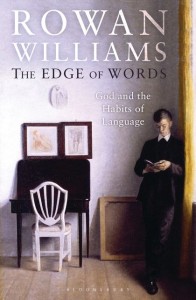 A review of The Edge of Words: God and the Habits of Language by Rowan Williams. (Bloomsbury, 2014)
A review of The Edge of Words: God and the Habits of Language by Rowan Williams. (Bloomsbury, 2014)
The Edge of Words: God and the Habits of Language, Rowan Williams, Bloomsbury.
Natural theology involves looking at the world and coming to conclusions about God based on what we see, as in William Paley’s famous and often caricatured analogy of finding a watch on the ground and concluding that it must have been designed by someone. In his new book The Edge of Words, Rowan Williams takes a feature of our world – language – and concludes that it infers profound things about the God we believe in. Williams argues that our universe is to all intents and purposes as our language constructs it (think about how babies gradually make sense of their world by naming things) and that beyond that word-constructed universe we begin to see glimpses of God. This is not an argument for proof of God’s existence, but rather an encouragement to think wider about this entity we call God.
Williams can write clearly when he wants to. Some of his more popular works explaining Christian faith are fine examples of fresh but simple exposition. Some of his other, let’s say, more intellectual works are famously torturous, not the least because he is so careful to qualify his statements. This latest book falls into the latter category, but this is no reason to dismiss it, or his other works. He is a subtle, deep and surprising thinker, and the attentive reader will be rewarded, even if at times the experience is like a typical spring day – alternating moments of cloudiness and illumination.
The writing itself perhaps proves his Wittgensteinian point that we can discover something about God by pushing language to the cliff edge and then peering over. He advises that we should “think to the point where there seems nothing further to be said and see what happens”. In this statement alone we can begin to see how his argument might have some affinity with meditative spiritual practices, and how in thinking about language we might conclude that it is far less self-contained than it appears.
For language is a strange thing. Williams points out that we think in metaphors more than we assume, and we assume that our vision of the world is just ‘what is’ rather than a construction. (To take two examples, in other languages the colour spectrum can be divided quite differently than in English, and we regularly don’t see things that are there if we don’t expect to see them.)
Additionally, language represents the universe but is itself a part of the universe it represents. Like consciousness, this is something of a puzzle.
For Williams, this has ramifications for how we think about God being ‘outside’ the universe. If God is ‘outside’ the universe (‘outside’ itself being a metaphorical term in this case), it is rather difficult to use language – a feature of the universe – to represent something that doesn’t abide by the conventions of the universe. Our thinking about God then becomes like chimpanzees thinking about astrophysics – beyond our capacities. Williams’ point is not that we should give up trying, but rather that this fact should make us pause for sober reflection.
This unsettling of assumptions has an important effect: rather than thinking of our relationship with God as an unchanging thing in a restless world, Williams suggests that our relationship to God will be like our relationship to language – constantly re-evaluated. God becomes less like a rock, and more like a river. For Williams, God is an infinite conversation partner, who continually reorients us as we make sense of the world, in a process of talking, questioning, correcting, and reconsidering.
Nick Mattiske blogs about books at Coburg Review of Books
Email This Story
Why not send this to a friend?

